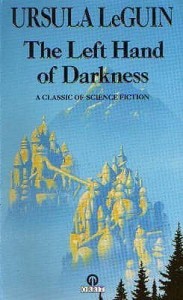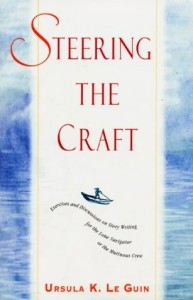Ursula K. Le Guin, 1929 – 2018
 Ursula K. Le Guin passed away last week at the age of 88, after a long and prestigious life in letters. In 2014, she was awarded the (US) National Book Association awarded Medal for Distinguished Contribution to American Letters. The citation included the following:
Ursula K. Le Guin passed away last week at the age of 88, after a long and prestigious life in letters. In 2014, she was awarded the (US) National Book Association awarded Medal for Distinguished Contribution to American Letters. The citation included the following:
“For more than forty years, Le Guin has defied conventions of narrative, language, character, and genre, as well as transcended the boundaries between fantasy and realism to forge new paths for literary fiction…
Among the nation’s most revered writers of science fiction and fantasy, Le Guin’s fully imagined worlds challenge readers to consider profound philosophical and existential questions about gender, race, the environment, and society. Her boldly experimental and critically acclaimed novels, short stories, and children’s books, written in elegant prose are popular with readers throughout the world.”
 I wholeheartedly agree with these observations, although as a reader I would say it more simply: I loved—and still love—Ms Le Guin’s junior classic, A Wizard Of Earthsea, and its two immediate sequels, The Tombs Of Atuan and The Farthest Shore: for the depth of their characterisation and worldbuilding, and the beautful, spare, powerful writing — all hallmarks of Ms Le Guin’s work.
I wholeheartedly agree with these observations, although as a reader I would say it more simply: I loved—and still love—Ms Le Guin’s junior classic, A Wizard Of Earthsea, and its two immediate sequels, The Tombs Of Atuan and The Farthest Shore: for the depth of their characterisation and worldbuilding, and the beautful, spare, powerful writing — all hallmarks of Ms Le Guin’s work.
 As an adult, I was blown away by The Left Hand Of Darkness—for all the reasons included in the citation: elegant writing, outstanding worldbuilding, and the challenge to consider alternate views of “gender, race, the environment, and society.” Not to mention the real science of her SFF novels and short fiction, including the invention of the ansible, which epitomises the concept of faster-than-light communication in a universe of slower-than-light travel.
As an adult, I was blown away by The Left Hand Of Darkness—for all the reasons included in the citation: elegant writing, outstanding worldbuilding, and the challenge to consider alternate views of “gender, race, the environment, and society.” Not to mention the real science of her SFF novels and short fiction, including the invention of the ansible, which epitomises the concept of faster-than-light communication in a universe of slower-than-light travel.
In addition, Ursula Le Guin has penned some of my favourite quotes on writing, all from her book on the art and craft of literature, Steering The Craft. Here are just a few of them:
“Somebody asked Willie Nelson where he got his songs, and he said, ‘The air’s full of melodies, you just reach out…’ The world’s full of stories, you just reach out.”
“…the story boat is a magic one. It knows its course. The job of the person at the the helm is to help it to find it’s own way to wherever it’s going.”
 “The chief duty of a narrative sentence is to lead to the next sentence … [because] the basic function of the narrative sentence is to keep the story going and keep the reader going with it.”
“The chief duty of a narrative sentence is to lead to the next sentence … [because] the basic function of the narrative sentence is to keep the story going and keep the reader going with it.”
When Ms Le Guin received the National Book Association Medal for Distinguished Contribution to American Letters, I could think of few more worthy recipients. When the news of her death came through last week, I felt a profound sense of intellectual and emotional loss.
She has left a tremendous legacy and an equally significant gap in our literary and cultural ranks. And although I can read and reread her writing, I shall miss simply knowing she’s there.








I couldn’t agree more, Helen. I miss just knowing she was there, ready to make one of her invariably trenchant observations about the current creative/political landscape… But like Ged, I suppose she is ‘done with doing’. Or maybe she’s doing somewhere else? I like to think so 😉